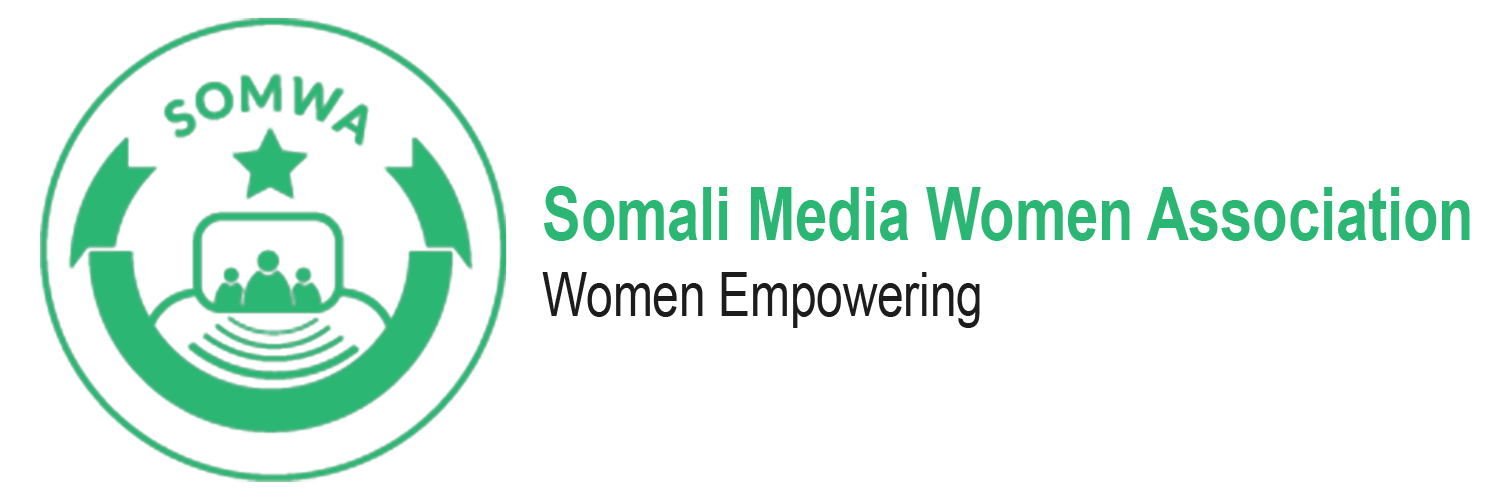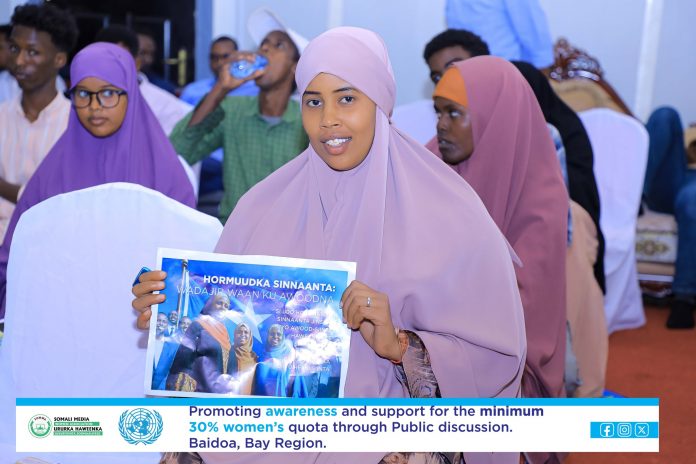Baidoa, Somalia — The Somali Media Women Association (SOMWA), with the support of the United Nations Assistance Mission in Somalia (UNSOM), hosted an open discussion yesterday aimed at raising awareness and support for the implementation of a minimum 30% women’s quota in Somali politics. The event saw the participation of five experts, including individuals living with disabilities, and attracted a diverse audience of thirty participants, encompassing local authorities, women, youth, minorities, and the media.
The event was inaugurated by MP Luul Ibraahim, a member of the parliamentary human rights committee and the women’s caucus. MP Luul is part of a dedicated group of female politicians touring Somali federal states, including Baidoa, to promote women’s political participation, with a particular focus on the minimum 30% women’s quota. She emphasised the group’s commitment to achieving this quota but underscored the necessity of support from all sectors of society, especially the media, civil society, and male allies.
Fadumo Armiye, a female leader in civil society organisations (CSOs), highlighted the importance of addressing gender inequality and increasing women’s representation in leadership and decision-making processes. She stressed that these efforts are the foundation of Somalia’s minimum 30% women’s quota.
Ruqiya Adan from SOMWA’s secretariat opened the discussion by underscoring the media’s crucial role in raising awareness about the women’s quota campaign. She stated that the media should promote accountability, amplify women’s voices, challenge stereotypes, and portray female leaders and activists positively. SOMWA, she added, is committed to fulfilling this role.
The forum, structured into two sessions, included a question-and-answer segment that allowed panellists to address pressing questions and provided a platform for attendees to express their views and concerns. The first session focused on changing perceptions and overcoming barriers to women’s political participation.
Aamino Mohamed Abdi from the South West Ministry of Women and Human Rights, one of the panellists, spoke about the systemic barriers women face in politics. She pointed out that, while many women work in low-paying jobs unnoticed, their aspirations for higher positions often attract undue scrutiny and criticism. This systemic denial, she said, must end.
Another panellist, Fadumo Armiye, argued that women, making up more than half of Somalia’s population, should have equal rights to men in all areas, including education, business, civil service, and parliament. She cited the successful leadership of Hon. Fowziya, a former foreign minister and deputy prime minister, and Ms. Saadia Yasin Haji Samatar, the current deputy speaker of parliament, as evidence of women’s capability to lead and effect change.
Muslimo Adan Hassan, a lifelong advocate for people with disabilities, expressed her frustration over the lack of representation for women with disabilities in politics. She called for a societal shift in mindset towards not only people with disabilities, but also minority and marginalised groups.
Hassan Mohamed Abdikarin and Aamino Mohamed Abdi agreed on the importance of placing women at the centre of decision-making through public discussions and meetings with traditional leaders and male allies.
Adan Mayow, representing the youth organisation, urged men to use their societal positions to advocate for gender equality on various platforms, including politics and the workplace. He emphasised the need for gender-inclusive policies and the active promotion of women’s representation in decision-making roles.
The second session of the forum focused on the impact of women’s political participation on economic development. Fadumo Armiye pointed out that increased female representation in decision-making leads to greater political participation and economic growth, describing it as a “win-win situation.” Aamino Mohamed Abdi added that women leaders often prioritise poverty reduction programmes, particularly those benefiting women and children, advocating for women’s inclusion in leadership for the country’s prosperity and stability.
Participants also shared their perspectives. Abdimajid Mohamed Abdulahi encouraged female leaders to support and inspire their peers. However, Muktar Sheikh Adan suggested that women should remain in basic jobs, citing emotional reasons as a barrier to holding high positions.
The discussion concluded with a call for ongoing dialogue and collaboration among stakeholders to address the challenges faced by women, especially female politicians. SOMWA plans to hold additional forums in other cities to broaden the conversation and gather more input from across the country. SOMWA is grateful for UNSOM’s support in implementing our strategic plans, and we encourage anyone interested in shedding light on women’s issues and empowering them to join our changing narrative and make history.
See the photos
































